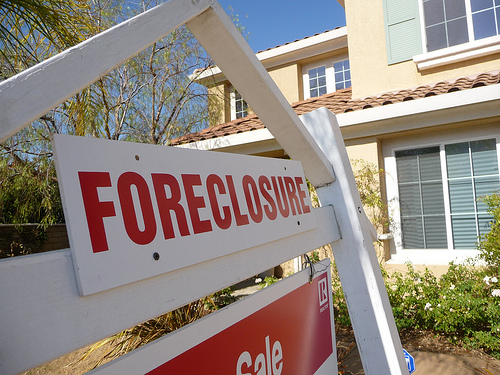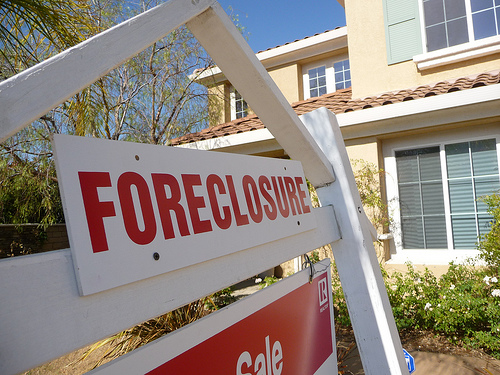
Flickr/<a href="http://www.flickr.com/photos/pagedooley/4052874486/sizes/m/in/photostream/">kevindooley</a>
Could one bank’s admission about dubious foreclosure documents cast doubt over millions of foreclosures filed by Wall Street banks in the past few years?
A quick recap: On Monday, a brief news item appeared saying that GMAC Mortgage, a multibillion-dollar housing subsidiary of Ally Financial, may “need to take corrective action in connection with some foreclosures” and had halted parts of the foreclosure process in 23 states, including Florida, a foreclosure hotspot. The news immediately took the housing industry by surprise and set the foreclosure blogosphere abuzz. Soon after, GMAC clarified its position to say there was no moratorium. But the company did say it had temporarily halted numerous evictions and foreclosure sales in those 23 states. A GMAC spokeswoman told Bloomberg News that the move resulted from a “defect” in the company’s foreclosure paperwork that was merely “technical.”
The way GMAC put it, some minor, non-factual errors caused a hiccup in their foreclosure pipeline. According to a company statement, “a new process has already been developed and implemented so that though some existing foreclosures may experience delays while corrective action is taken, there will be no interruption in new foreclosures.” But state officials, experts, and foreclosure defense attorneys say there’s a lot more going on—and that the ramifications of GMAC’s decision could send shockwaves throughout other big banks, mortgage servicers, and possibly the entire foreclosure industry.
The controversy surrounding GMAC hinges, in large part, on a single employee and statements he made in several depositions in the past year. Jeffrey Stephan oversaw a team of more than a dozen employees whose job it was to “execute”—i.e., sign—foreclosure documents. This included reviewing crucial affidavits used in foreclosures, including what’re called summary judgment affidavits, the final hurdle in seizing somebody’s home in a court-handled foreclosure. In a June deposition (pdf), Stephan said his outfit handled 6,000 to 8,000 of these documents each month. Yet under questioning, Stephan all but admitted, under oath, that he didn’t really read those crucial documents or know what they precisely said:
Prosecuting attorney: “So other than the due date and the balances due, is it correct that you do not know whether any other part of the affidavit that you sign is true?”
Stephan: “That could be correct.”
There’s just one problem with this: According to federal rules of civil procedure, affidavits like the kind Stephan was signing “must be made on personal knowledge, set out facts that would be admissible in evidence, and show that the affiant is competent to testify on the matters stated.” In other words, if you sign a foreclosure affidavit, you have to know what that document says—indeed, you should be so familiar with it that you could defend its contents in court. But GMAC’s Stephan conceded that he really didn’t know what those tens of thousands of documents, used to foreclose on homeowners around the country, actually said.
The problems resulting from Stephan’s statements are likely one of the causes for GMAC’s recent announcement. (The Florida attorney general’s two investigations into Florida’s four largest foreclosure law firms, which GMAC retained, no doubt played a role, too.) As noted earlier, the company describes these affidavit problems as “technical”; a spokeswoman, Gina Proia, added that “the sum and substance of the affidavits and all content were factually accurate.” Foreclosure defense attorneys and state officials, however, see far larger ramifications stemming from GMAC’s predicament.
In recent years, as the number of foreclosures on banks’ books mounted, some came to rely on what critics call “robo signers”—employees whose job it is to sign countless documents to keep the foreclosure process chugging along. (The attitude here is similar to that of the assembly line-like law firms litigating foreclosures for banks, often called “foreclosure mills,” which Mother Jones has extensively reported on.) That would include people like GMAC’s Stephan. But attorneys representing homeowners and other advocates question the validity of foreclosures that rely on documents executed by robo signers. If they execute 18,000 cases a month, as Chase Home Finance employee Beth Cottrell described in a May deposition, then there’s no way bank employees who sign off can have personal knowledge of every document, critics argue. As Palm Beach, Florida-based defense attorney Margery Golant says, “They don’t have any personal knowledge of this stuff. They’ve made a mockery out of the legal system.”
Christopher Immel, an attorney for Ice Legal, a Florida foreclosure defense firm, said each and every foreclosure that relied on an affidavit signed by GMAC’s Stephan is shrouded in doubt. “People who lost their homes to evidence like that did have their homes taken wrongly,” he says. Indeed, Immel tells Mother Jones that one major Florida foreclosure law firm, Florida Default Law Group, has already begun withdrawing affidavits signed by Stephan knowing that they’re faulty and ripe for challenging.
Immel adds that the effects of GMAC’s decision to revisit foreclosures involving tainted legal documents could ripple throughout the housing industry. For instance, in May, another Ice Legal attorney took the deposition of Chase’s Cottrell, whose firm is a subsidiary of JPMorgan Chase. In that deposition, Cottrell similarly conceded that she didn’t have the “personal knowledge” required to sign the foreclosure documents that crossed her desk.
One state official told Bloomberg News that the kinds of admissions made by GMAC and Chase employees could have a broad impact. “It would call into question whether other servicers have engaged in similar practices,” Iowa assistant attorney general Patrick Madigan said. “It would be a major disruption to the foreclosure pipeline.” Adds Golant: “GMAC is just the tip of the iceberg. They all do it. They all do it all the time.”
Indeed, one judge in central Florida told Mother Jones that, in the past week, she’s seen attorneys representing several other big banks file what she called “mysterious” motions to proactively withdraw foreclosure affidavits. The firms say the affidavits “may not have been properly verified”—the same problem with the documents at the heart of GMAC’s headaches. Having never seen a spate of withdrawals like this before, the judge, Pasco County’s Lynn Tepper, questioned whether other banks might be hoping to avoid the kind of public scrutiny now on GMAC by quietly clearing up conflicts with robo-signed documents. Tepper called the motions “unbelievable,” and said she might seek to vacate foreclosures—instead of merely delaying them—where banks try to swap out bogus documents for new ones.
To be sure, in plenty of the cases involving questionable paperwork robo-signed by Jeffrey Stephan, there’s no doubt GMAC originally had the right to foreclose. But, as Ice Legal’s Immel notes, “The bank might have gotten the home through the regular foreclosure process. But now we really don’t know.”













